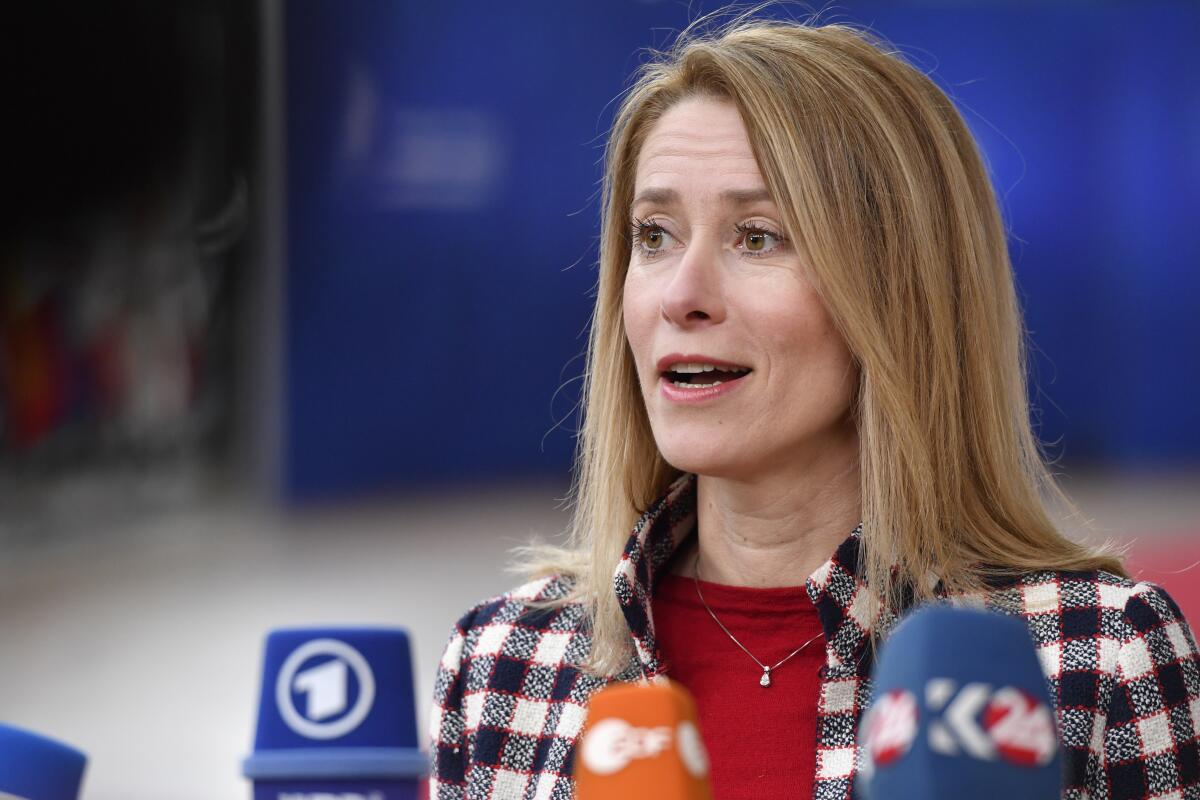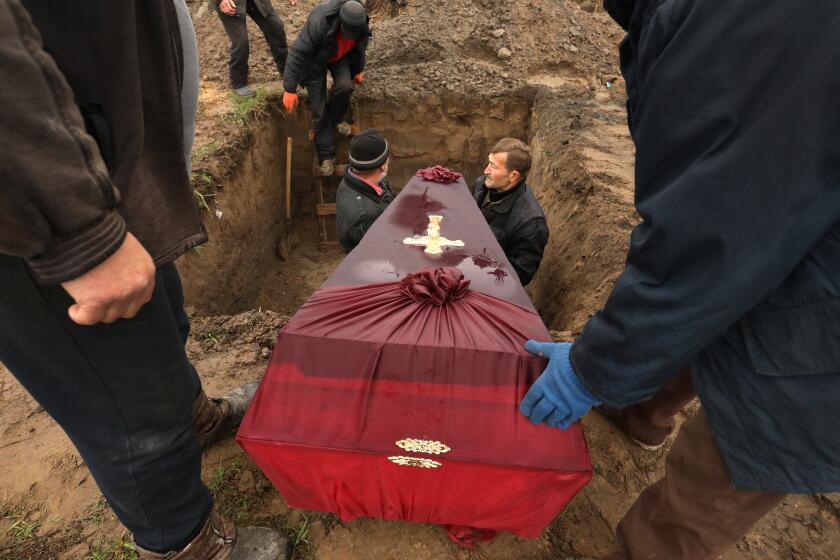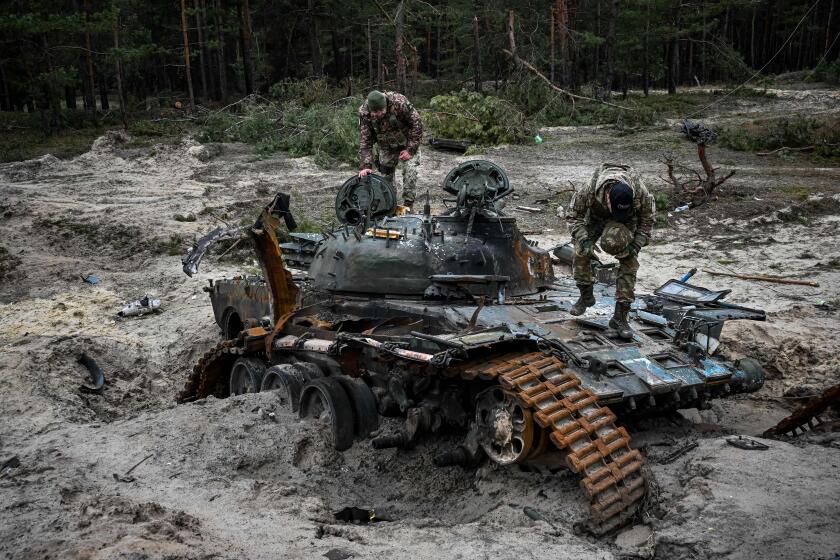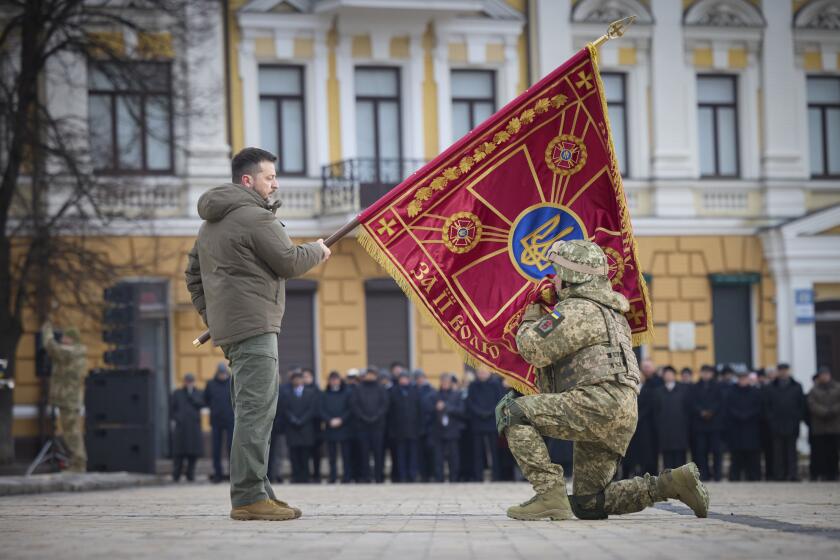European Union leaders endorse joint ammo purchases for Ukraine

- Share via
BRUSSELS — European Union leaders endorsed a plan Thursday for sending Ukraine 1 million rounds of artillery ammunition within the next 12 months to help the country counter Russia’s invasion forces.
EU foreign and defense ministers approved the plan for a fast-track purchasing procedure earlier this week, and the leaders of the bloc’s 27 member nations gave it their political blessing at a summit in Brussels Thursday.
“Taking into account the security and defense interests of all member states, the European Council welcomes the agreement ... to deliver ground-to-ground and artillery ammunition to Ukraine and, if requested, missiles,” the meeting’s conclusions on Ukraine read.
Ukrainian President Volodymyr Zelenskyy thanked leaders for the initiative earlier during a video call. According to a diplomat with direct knowledge of the conversation, Zelenskyy spoke from a moving train as he visited front-line areas.
Russian atrocities number in the tens of thousands, Ukraine says. The ICC wants to arrest Putin. But what are the prospects for justice?
The diplomat, who could not be identified because discussions took place behind closed doors, said Zelenskyy also asked leaders to deliver modern aircraft and long-range missiles to help Ukraine’s resistance.
With Ukraine facing ammunition shortages after more than a year of fighting, Estonian Prime Minister Kaja Kallas brought to the table last month the idea of the EU setting up a joint purchasing plan similar to the one devised during the coronavirus pandemic to buy vaccines.
“What is critical is sending ammunition to Ukraine fast, because that might bring a change in this war,” Kallas said as she arrived at the summit.
Under the plan, the European Defense Agency will — in parallel with deliveries — aggregate requests from member states to restock, and lead a fast-track procedure for direct negotiations with industrial providers of ammunition in Europe.
According to various estimates, Ukraine is firing 6,000 to 7,000 artillery shells a day, around a third of Russia’s total.
The Ukrainian military’s surrender hotline, dubbed ‘I Want to Live,’ is enticing some Russian soldiers to quit the battlefield as the war drags on.
“The EU supports Ukraine in its relentless quest for freedom,” European Council President Charles Michel said. “We stand with Ukraine for as long as it takes.”
EU foreign policy chief Josep Borrell said this week that he secured approval for earmarking 1 billion euros ($1.1 billion) to encourage member nations to provide artillery shells from their existing stocks and any pending orders. Another 1 billion euros would go toward accelerating new orders and encouraging countries to work together on making purchases through the European Defense Agency or in groups of at least three nations.
Hungary has said it will not take part in getting ammunition to Ukraine, citing its commitment to peace, but said it wouldn’t prevent other members from doing so by blocking the deal.
Last month, Hungarian Prime Minister Viktor Orbán said the EU was partly to blame for prolonging Russia’s war in Ukraine by sanctioning Russia and supplying Ukraine with money and weapons, rather than seeking to negotiate peace with Moscow.
Bulgaria’s President Rumen Radev also ruled out the delivery of shells as long as a caretaker government remains in charge in the country.
Across the country, Ukrainians looked back on a year of war with both sorrow and pride as their president vowed to push for victory over Russia.
“This is our sovereign decision,” he said. “Bulgaria will support European diplomatic efforts to restore peace.”
Leaders also discussed the possibility of topping up with an extra 3.5 billion euros the European Peace Facility — a fund being used to reimburse member countries that provide weapons, ammunition and military support to Ukraine.
U.N. Secretary-General António Guterres joined the EU leaders for lunch Thursday. Guterres described a grim global situation, with the world facing a “perfect storm” in many areas.
“More hunger, more poverty, less education, less health services,” he said. “And it is clear that our international financial system is not fit for purpose to deal with such a huge challenge.”
The EU leaders also are set to discuss the bloc’s competitiveness and its response to the $369 billion U.S. Inflation Reduction Act. Friday’s discussions will focus on economic and financial issues.
Veselin Toshkov in Sofia, Bulgaria, contributed to this story.
More to Read
Sign up for Essential California
The most important California stories and recommendations in your inbox every morning.
You may occasionally receive promotional content from the Los Angeles Times.













